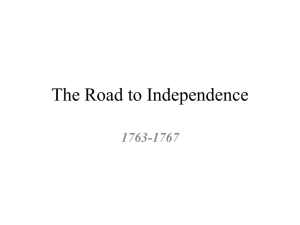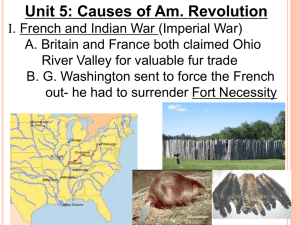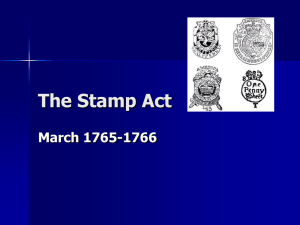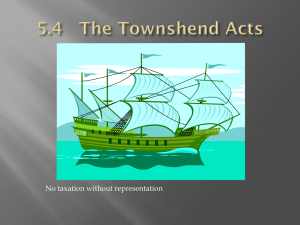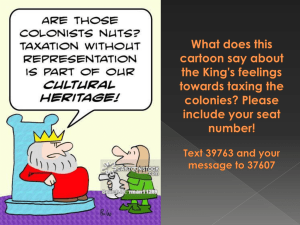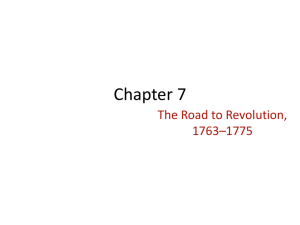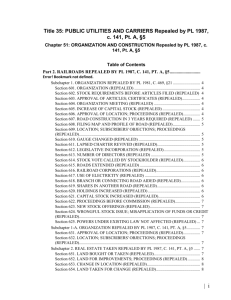Stamp Act
advertisement
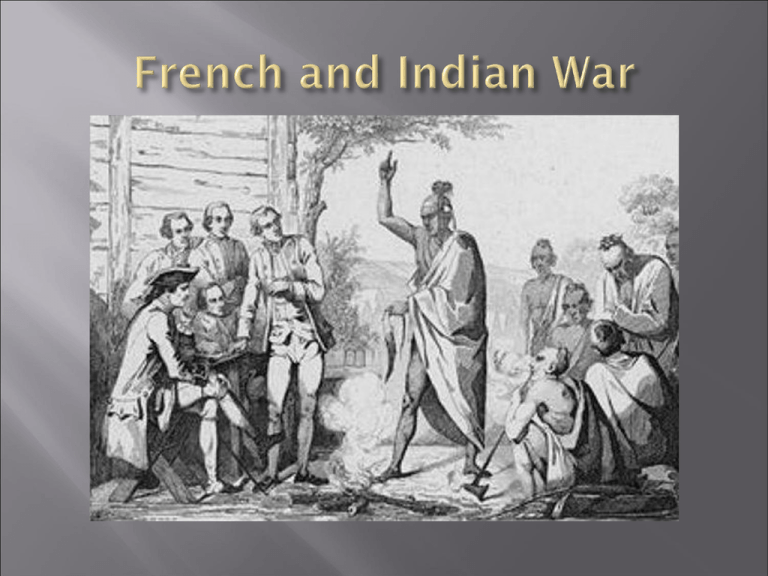
G.B. has claimed victory in the French and Indian War but at a very high cost. Wars are expensive, As a result, GB is in massive debt! They have just passed the Proclamation of 1763, however the colonists are ignoring this law. What will GB do as a result?? Br. soldiers need housing Over time this becomes expensive Remember: GB is in debt….. What should they do? Law that required colonists to house all Br. soldiers. GB is still in massive debt! They need more revenue. What is the next logical step…… Parliament passes the Sugar Act: tax placed on sugar, molasses. Stamp Act: all legal and commercial documents must carry an official tax showing a tax had been paid. BRITAIN Sugar/Stamp Acts are reasonable ways to raise revenue to pay off debt. COLONIES Serious threat to political rights. Parliament has NO right to tax colonies (Colonial Assembly) NO tax should be created without their consent. 1765: delegates from 9 colonies form the Stamp Act Congress. Draft a petition to King George. “No taxation without representation” 1st time colonies are united against Br. Br. opposes the laws in two ways…. Non-violent Financial consequences British repealed Stamp Act Declaratory Act Parliament has supreme authority to govern the colonies now “The Americans have not acted in all things with prudence and good temper. They have been driven to madness by injustice. Will you punish them for the madness you have caused? My opinion is that the Stamp Act be repealed immediately.” What two ways did the colonists protest? Which was more effective and why? Why did the colonists feel that the series of acts passed by Britain was a violation of their natural rights? What does “taxation without representation” mean? Why were the colonists adamant about this? Stamp Act ($)- Repealed Sugar Act ($)- Repealed Repeal: Eliminate or revoke Declaratory Act: Parliament has supreme authority to govern colonies. G.B. still needs $$$$$$$ Massive debt Need new way to pay debt Charles Townshend (GB financial minister) creates tax on imports: Glass Paper Paint Lead Tea GB officers allowed search warrants to enter homes & look for smuggled goods Tax should be the job of the Assembly! Search warrants go against Natural Rights! (Whose idea was this?) More boycotts – trying not be violent Daughters of Liberty 5 colonists killed John Adams defends British soldiers who were charged with murder Did this to prove everyone is entitled to a fair trial They were acquitted Colonists refused to buy tea GB makes East India Company main company – pushing out business for colonists Committees of Correspondence – groups from different colonies that exchanged numerous secret letter about colonial affairs and resistance to British authority. Year Br. Actions Am. Actions 1763 Proclamation of 1763: prohibits settling W of 13 col. Settlers ignore proclamation 1764 Navigation Acts strictly enforced 1765 Stamp Act passed 1766 Stamp Act repealed 1767 Townshend Acts passed 1770 Townshend Acts repealed except for tea tax boycott Br. goods Br. goods boycotted Group of men disguised as Native Americans board 3 tea ships and destroyed 342 chest of tea Colonists rejoiced Offered to pay back tea if tax is repealed British say NO! Push Americans to rebellion! What effect did his illustration have upon the colonies? Identify which acts the colonists boycotted and which they protested violently. Stamp Act, Sugar Act, Townshend Acts, Intolerable Act, Tea Act (Use pgs.161-166) How did the outcome of the acts differ? Direct attack on colonists rights’ and liberties Closed the Boston port until colonists paid tea Banned town meetings Replaced elected council with appointed one Increased governor’s power Protected British officials accused of crimes Allowed British troops to house troops in private dwellings Delegates from each colony (except GA) met in Philly to vote on banning all trade with GB until Intolerable Acts were repealed.

